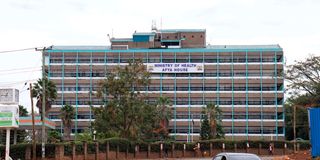97pc of Kenyans seeking treatment abroad go to India - report

Ministry of Health headquarters in this picture on March 27, 2022. The ministry's recent report shows that about 97 percent of Kenyan patients who seek medical treatment abroad go to India.
About 97 percent of Kenyan patients who seek medical treatment abroad go to India, the Ministry of Health (MoH) says in its 2015-2020 report on medical tourism.
The Asian country’s booming medical tourism industry is worth about $9 billion dollars and accounted for about 20 percent of the global market share by 2020, with a huge chunk of these people coming from East Africa.
After India, the most popular destinations for Kenyans seeking medical care abroad include South Africa, the US and the United Kingdom.
A majority of Kenya patients who travelled to India had cancer (36 percent), followed by cardiovascular diseases (19 percent), musculoskeletal conditions (13 percent), renal ailments (12 percent) and central nervous system conditions (nine percent), said a health standards unit headed by Dr Patrick Amoth in the MoH.
Also read: Medicine abroad: Doctor or not?
“Cancer remained the highest cause of referral abroad from 2016 up to 2020. Out of all patients referred for treatment abroad, 48 percent … were referred for specialised surgery including organ transplantation,” the report says.
Others were review and second opinion (22 percent), PET scan and other diagnostic tests (17 percent), stem cell transplant (9.5 percent) and radiotherapy and chemotherapy (3.9 percent).
The proportion of patients referred for PET scans and other diagnostic tests has declined substantially from 21 percent in 2015 to 5 percent in 2020, the report says.
This is because such tests are now available at Aga Khan University Hospital and Kenyatta University Teaching Referral and Research Hospital in Nairobi.
Of the 853 patients approved for treatment abroad between 2015 and October 2020, some 52 percent were male and 48 percent female. Six of the patients did not indicate their gender.
“The youngest patient was aged 4 days while the oldest patient was 86 years old. Cumulatively, the mean age was 39 years with a median age of 44 years,” the ministry found.
Data also shows that most of the Kenyans seeking treatment abroad came from Nairobi.
“Majority of them lived in Nairobi (611), followed by Kiambu (114), Mombasa (85) and Uasin Gishu county (55).”
The report also shows that the National Hospital Insurance Fund (NHIF) covered 85 percent of all patients referred for treatment abroad, while private insurers paid for eight percent.
Some 6.5 percent of the patients paid for their treatment from their own pockets, the report says.
Why abroad
Some patients interviewed by the Nation cited high costs of treatment in Kenya, long waiting periods, and lack of specialised medics and equipment as some of the reasons for seeking medical care abroad.
Indian hospitals are attractive to Africans because they are always ready to do business and offer transport services to ensure patients arrive and settle in with ease, apart from partnering with real estate owners and hotels to offer affordable accommodation to foreign patients, said Mr Akhil Dave, general manager at Geetanjali Hospital in Rajasthan State, India.
“We do not expect you to land from Kenya for the first time to a new culture and environment, then start looking for accommodation all by yourself when we can make it easier by ensuring that you arrive to a fully furnished house of your choice,” he said.
He added: “What makes treatment in India unique is the human touch and care given by our doctors, paramedical and all the staff generally. It makes us very attractive, backed by highly skilled professionals and advanced technology.”
Medical tourism
The Kenyan government says it is also working to advance its own medical tourism as the number of patients coming from neighbouring countries increases.
“Kenyans and the Government of Kenya spend about Sh10 billion annually seeking medical treatment abroad, thus the urgent need to reduce … foreign expenditure and use the same funds to improve health systems locally,” the report says.
“Kenya has already attracted medical tourism from some East and Central African countries such as Tanzania, Uganda, South Sudan, Ethiopia, Rwanda, Burundi, Congo and Nigeria, hence the need to accelerate the presenting opportunity.”
The report says several hospitals in Kenya are already marketing their medical to potential patients in the region – Kenyatta University Teaching and Referral Hospital, Kenyatta National Hospital, Moi Teaching and Referral Hospital (MTRH), Nairobi Hospital, Karen and Mediheal.
“MTRH receives about 250 patients every year from neighbouring countries seeking treatment at the facility. Most are from Uganda, South Sudan and Tanzania hence the need to improve,” the report says.
“Research conducted recently noted that the private health sector in Kenya is one of the most developed and dynamic in sub–Saharan Africa. Also, Kenya is among the top six destinations where Africans visit seeking high-end specialised medical services, hence the need to leverage on public private partnership.”
Experts say the lockdowns that came with the Covid-19 pandemic confined patients to ‘African medical tourism’, where the number of patients seeking treatment in facilities like Aga Khan Hospital went up.
Mediheal’s Parklands branch received 50 medical tourists in the last one year, Gokul Prem Kumar, vice-president of business relations, told the Nation.
“In the last one year we have received patients from Sierra Leone, DRC, Congo Brazzaville, Central African Republic, Uganda, Rwanda Ethiopia, Somalia, Tanzania, Burundi, Malawi and South Sudan,” he said.
“Cardiovascular diseases (CVDs) represent 32 percent of all global deaths and are on the rise, especially sudden cardiac deaths (SCD).”
He cited the need for preventive medicine, patient education and awareness.
“CVDs are directly associated with non-communicable diseases like diabetes and blood pressure, which can be managed with changes in lifestyle,” he said.
“Mediheal serves patients from all over sub-Saharan African countries and many are unaware about their cardiac conditions. Only when they undergo cardiac fitness as part of any major surgery are the heart blocks identified.”





